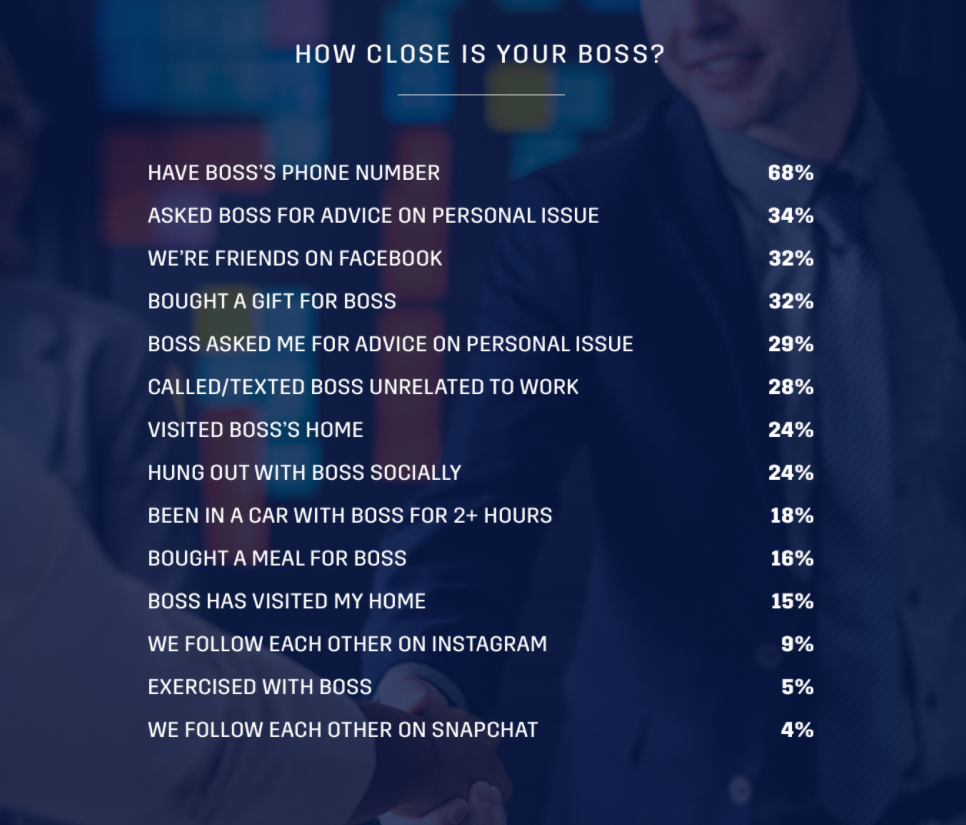How much of your personal life are you comfortable sharing with your boss? And how can you tell if you’re getting too close for comfort?
You probably spend more time in the average week with your boss and colleagues than with your friends and loved ones, so it’s important that you get along with them. Recent research from Olivet Narzarene University, surveying 3,000 US workers, shows that some employees are comfortable sharing more than just stationary with their boss – but perhaps they’re a little too comfortable.
We recently reported that employees aren’t overly interested in being friends with their colleagues, but perhaps getting to know the person in charge is a different story?
How much do you want to share?
The top two ‘bonding indicators’ seem quite standard. Sixty-eight per cent of people have their boss’ personal number – a lot of companies don’t offer work mobiles, so this makes sense. Thirty-four per cent of respondents seek advice on personal issues from their boss – this seems appropriate, within reason, and a good way to build rapport. The third factor however raises a few red flags, 32 per cent are friends on Facebook (nine per cent say they follow each other on Instagram and four per cent do so on Snapchat).
When you invite your boss into your “social world” it’s easy to blur the lines between professional and personal; things could become complicated very quickly. Think about it, do you really want your boss to know what you get up to at 2am in the morning?
Alexandra Tselios, founder and publisher of The Big Smoke offers a different perspective.
“I really don’t think it is a big deal to add your boss to your Facebook page,” she told the Sydney Morning Herald.
She says it’s likely that employers will look you up on Facebook or “Google you” anyway; it’s just the world we live in.
“I don’t people should be afraid of adding their boss on their Facebook page and of course it is up to the individual to act responsibility but I wouldn’t judge someone on what they did in their personal life.”

When looking at the statistics through a gender lens, it seems women are more inclined to connect with their boss on an emotional level, buying them gifts and accessing their private life via social media, whereas males take a more “traditional” bonding approach such as exercising together and sharing a meal.

The top three industries that report being the most familiar with their boss’ are real estate, restaurant/food service and marketing/advertising and PR. Maintaining a purely professional relationship with your boss doesn’t seem to be a problem for the HR world, sandwiched between science and education as being the least familiar with their boss on a personal level.
Bringing them into your inner circle
Apparently, boss’ who introduce their partners and children to their colleagues have happier teams. Sixty per cent of people report meeting their boss’ partner and 55 per cent have introduced their own partner to their boss. Around half of people also met each other’s children.
According to the study, 74 per cent of people who are “very happy at work” have met their boss’ significant other. It’s probably not as simple as meeting your manager’s significant other and suddenly feeling a surge of happiness. It might be that organisations that encourage a “family friendly” policy tend to cultivate a happier overall culture.
Too close for comfort
As we’ve previously reported, there are downfalls to being too close with your boss. Being named as the “teacher’s pet” by other colleagues can be harmful to your workplace relationships and can stunt your career progression if things go south.
Once you break the professional boundaries, it’s very difficult to repair them.
A Fast Company article interviewed anonymous employees about their experiences of a boss who crossed the line. A man, who they’ve named Michael, recalls working in a small organisation with a boss who was keen “to be everybody’s friend”. While this pursuit was likely backed with good intentions, Michael says he sometimes felt forced to socialise with him out of work hours because “he was my boss and signed my paychecks”.
Michael said the boozy intimacy that accompanies off-the-clock socialising led to his boss revealing that he’d been cheating on his wife and this is when he knew the relationship was unhealthy. Sick of being caught up in his boss’ personal issues, he starting pursuing other opportunities – which his boss took personally and reportedly “insulted him repeatedly”.
“He fired and rehired me about four times,” Michael recalls. Eventually Michael resigned and said that “being so close to [his boss] allowed [him] to see the personal side of him, and that just struck [him] as unprofessional.”
At the end of the day, nothing is cut and dry in human relationships. As long as there’s a level of professional decorum, you can add them on Facebook or share some stories over a beer or two if that’s something you both want to do. Just remember that your professional fate lies in their hands, so don’t take things too far.
Image: rawpixel.com view Pexels.


Would be great if people proof read their articles prior to posting.